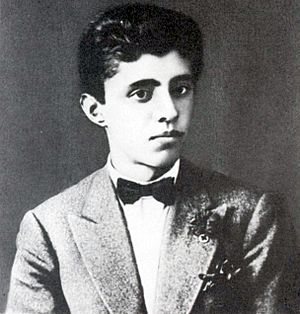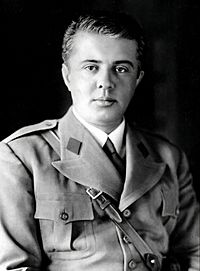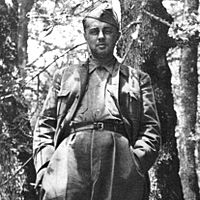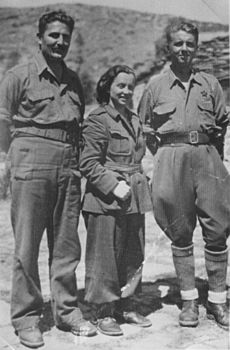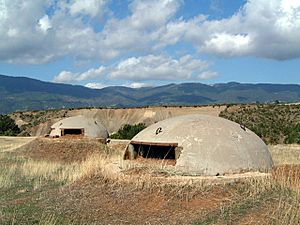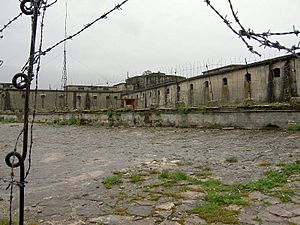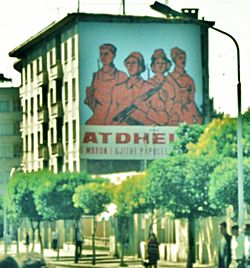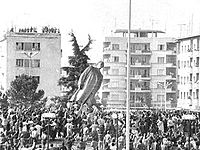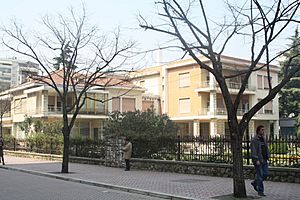Enver Hoxha facts for kids
Quick facts for kids
Enver Hoxha
|
|
|---|---|
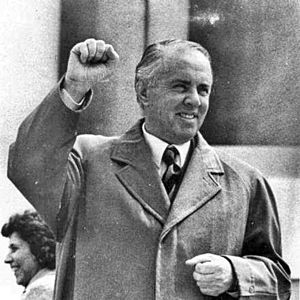
Enver Hoxha in 1971
|
|
| First Secretary of the Party of Labour of Albania | |
| In office 8 November 1941 – 11 April 1985 |
|
| Preceded by | Position established |
| Succeeded by | Ramiz Alia |
| 22nd Prime Minister of Albania | |
| In office 23 October 1944 – 19 July 1954 |
|
| President | Omer Nishani Haxhi Lleshi |
| Deputy | Myslim Peza Koçi Xoxe Mehmet Shehu |
| Preceded by | Ibrahim Biçakçiu |
| Succeeded by | Mehmet Shehu |
| Minister of Foreign Affairs | |
| In office 22 March 1946 – 23 July 1953 |
|
| Prime Minister | Himself |
| Preceded by | Omer Nishani |
| Succeeded by | Behar Shtylla |
| Minister of People's Defence | |
| In office 23 October 1944 – 31 July 1953 |
|
| Prime Minister | Himself |
| Succeeded by | Beqir Balluku |
| Personal details | |
| Born |
Enver Halil Hoxha
16 October 1908 Ergiri (Gjirokastër), Janina Vilayet, Ottoman Empire |
| Died | 11 April 1985 (aged 76) Tirana, Albania |
| Resting place | People's Cemetery, Tirana, Albania |
| Political party | Party of Labour of Albania |
| Spouse | |
| Children |
|
| Alma mater | University of Montpellier Free University of Brussels |
| Awards | Hero of the People Order of Lenin Order of Skanderbeg Order of the People's Hero Order of Suvorov Hero of Socialist Labour Order of the Partisan Star Order of the Flag |
| Religion |
|
| Ideology | Left-wing nationalism Hoxhaism |
| Signature |  |
| Military service | |
| Allegiance | LANÇ (1941–1945) People's Republic of Albania (1944–1985) |
| Branch/service | LANÇ (1941–1945) Albanian People's Army (1944–1985) |
| Years of service | 1941–1985 |
| Rank | Army General |
| Commands | LANÇ Albanian People's Army (supreme commander) |
| Battles/wars | World War II:
|
Enver Halil Hoxha (born October 16, 1908 – died April 11, 1985) was an Albanian political leader. He was the ruler of Albania from 1944 until his death in 1985. He was the First Secretary of the Party of Labour of Albania from 1941 until he died. He also served as the 22nd Prime Minister of Albania from 1944 to 1954. At different times, he was also the foreign minister and defense minister of the People's Socialist Republic of Albania.
Hoxha was born in Gjirokastër in 1908. He became a teacher in 1936. After Italy invaded Albania, he joined the Party of Labour of Albania when it was formed in 1941. He became the First Secretary in March 1943. After Albania was freed from occupation, King Zog's rule ended, and Hoxha became the country's leader.
During his 41 years in power, his government worked to rebuild Albania after World War II. They built the country's first railway, increased the number of adults who could read from 5-15% to over 90%, and brought electricity to the whole country. They also worked to make Albania self-sufficient in farming. His government made religion illegal, stopped people from traveling abroad, and ended private ownership of businesses. They also arrested or punished many people who owned land, religious leaders, farmers who didn't want to join collective farms, and even party officials who weren't loyal.
Hoxha's government followed a strict form of Marxism–Leninism, which is a type of communism. After Albania broke ties with China in the late 1970s, many communist groups around the world who followed similar ideas were called Hoxhaists.
Contents
Early Life and Education
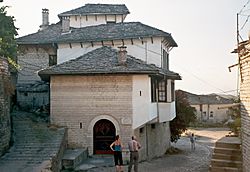
Enver Hoxha was born in Gjirokastër, a city in southern Albania. At that time, Albania was part of the Ottoman Empire. His father, Halil Hoxha, was a cloth merchant who traveled a lot. His mother was Gjylihan (Gjylo) Hoxha. His family was connected to the Bektashi Order, a type of Islam.
After finishing elementary school, he went to high school in Gjirokastër. Later, he received a scholarship to study at the French language Albanian National Lyceum in Korçë until 1930.
In 1930, Hoxha went to France to study natural science at the University of Montpellier. However, he lost his scholarship because he didn't focus on his studies. He then moved to Paris.
From 1935 to 1936, he worked as a secretary at the Albanian consulate in Brussels. When he returned to Albania, he became a teacher in Tirana. He taught French and morals at the Korça Liceum from 1937 to 1939 and also managed the school library.
On April 7, 1939, Fascist Italy invaded Albania. They set up a new government. Hoxha later moved back to Tirana and started working at a tobacco factory. He was a supporter of the Communist Group in Korça.
Joining the Partisans
On November 8, 1941, the Communist Party of Albania was created. It was later renamed the Party of Labour of Albania in 1948. Hoxha was chosen as one of the seven members of the temporary Central Committee. He gave an important speech at the first meeting of the Communist Party in April 1942.
In July 1942, Hoxha wrote a message called "Call to the Albanian Peasantry." This message asked farmers in Albania to support the fight against the fascists. It encouraged them not to pay taxes to the government. In September 1942, the National Liberation Movement was formed. Its goal was to unite all Albanians who were against fascism, no matter their beliefs.
By March 1943, Hoxha was officially elected as the First Secretary of the Communist Party. During World War II, the Albanian partisans (fighters) were organized into military units. They received help from the British intelligence service. The General Headquarters was created, with Spiro Moisiu as the commander and Hoxha as the political leader.
In August 1943, a secret meeting called the Mukje Conference took place between the anti-communist Balli Kombëtar (National Front) and the Communist Party of Albania. They tried to work together to fight the invaders.
Disagreements with Yugoslavia
A problem arose when the Yugoslav Communists disagreed with the idea of a "Greater Albania" (which would include areas like Kosovo). They asked the Albanian Communists to change their agreement. Hoxha said that Josip Broz Tito, the Yugoslav leader, did not believe that Kosovo was Albanian.
After the Albanian Communists changed their agreement, the Balli Kombëtar criticized them. The Balli Kombëtar then sided with Nazi Germany, which made many people who were fighting the fascists lose trust in them. The Communists gained more supporters and became the main group fighting for Albania's freedom.
A meeting in Permet called for a "new democratic Albania for the people." Although King Zog I was not officially removed, he was not allowed to return to the country. This helped the Communists gain more control. The Anti-Fascist Committee for National Liberation was formed, led by Hoxha. On October 22, 1944, this committee became the Democratic Government of Albania, and Hoxha was chosen as the temporary Prime Minister.
After Albania was liberated on November 29, 1944, Albanian partisan groups helped Tito's partisans and the Soviet Red Army fight the last German forces in Yugoslavia. The Democratic Front of Albania, led by the Albanian Communist Party, won the first post-war election on December 2, 1945. They were the only political group allowed to run.
On January 11, 1946, King Zog was officially removed, and Albania was declared the People's Republic of Albania. It was renamed the People's Socialist Republic of Albania in 1976. As First Secretary of the party, Hoxha became the most powerful person in the country.
Albanians celebrate their independence day on November 28. In the past, under the Communist government, the national day was November 29, the day the country was freed from the Italians. Both days are now national holidays.
Early Leadership (1946–1965)
Hoxha declared himself a Marxist–Leninist and greatly admired Soviet leader Joseph Stalin. From 1945 to 1950, the government took steps to strengthen its power. They arrested and punished people who disagreed with the government.
The Agrarian Reform Law was passed in August 1945. This law took land from large landowners and gave it to farmers without payment. Before this law, large landowners owned 52% of all land; afterward, it was only 16%. The number of people who could read greatly increased. In 1939, 90–95% of people in rural areas couldn't read. By 1950, this dropped to 30%, and by 1985, almost everyone could read.
By 1949, the US and British intelligence groups tried to send Albanian refugees back into Albania to fight the government. However, these groups were caught by Albanian security forces. A Soviet double agent had shared information about the plan, leading to the capture of many of these infiltrators.
In February 1951, a bombing happened at the Soviet embassy in Tirana. Afterward, 23 intellectuals were arrested. Some people were arrested and punished, and later found to be innocent.
The State University of Tirana was created in 1957, which was the first university in Albania. The old tradition of Gjakmarrja (blood feuds) was banned. Diseases like malaria were successfully fought through better healthcare and draining swamps. By 1965, malaria was no longer reported in Albania. In 1938, there were very few doctors and hospital beds. By 1950, there were four times as many hospital beds, and more money was spent on health.
Relations with Yugoslavia
At this time, Albania's relationship with Yugoslavia began to change. In October 1944, a Yugoslav group accused the Albanian Communist Party of making mistakes. They also said that Yugoslav communists had led the Albanian partisan movement.
Some Albanian Communist Party members thought this was a plan by Tito to weaken their party. Koçi Xoxe and others who supported Yugoslavia were viewed with suspicion. Tito believed Albania was too weak to be on its own and should become part of Yugoslavia. Hoxha claimed that Tito wanted to take over Albania, first by creating a Treaty of Friendship in 1946. Over time, Albania felt that this treaty mostly benefited Yugoslavia, making Albania dependent on it.
One issue was that the Albanian currency became linked to the Yugoslav currency, and Yugoslavia had a big say in Albania's economic plans. Albanian economists said that Yugoslavia was trying to make Albania's economy just an "appendage" to its own.
Stalin warned Hoxha that Yugoslavia was trying to take over Albania. By June 1947, Yugoslavia began to publicly criticize Hoxha. When Albania made agreements with the Soviet Union to buy farming equipment, Yugoslavia said Albania couldn't make agreements with other countries without their approval.
Koçi Xoxe tried to stop Hoxha from improving relations with Bulgaria, saying Albania would be more stable with one trading partner. Nako Spiru, an anti-Yugoslav party member, disagreed with Xoxe.
At a party meeting in February–March 1948, Xoxe was accused of trying to isolate Hoxha and gain more power. He said Hoxha was responsible for bad relations with Yugoslavia. Hoxha remained strong, and his support grew when Yugoslavia publicly broke ties with the Soviet Union. On July 1, 1948, Albania told all Yugoslav advisors to leave and canceled all agreements with Yugoslavia. Xoxe was removed from the party and later punished.
Relations with the Soviet Union
After breaking with Yugoslavia, Hoxha became close with the Soviet Union. From 1948 to 1960, the Soviet Union gave Albania $200 million for development. Albania joined the Comecon in 1949 and became a Soviet ally on the Adriatic Sea. A Soviet submarine base was built on the Albanian island of Sazan. Relations with the Soviet Union were strong until Stalin died in March 1953. Albania had 14 days of national mourning for Stalin, even more than the Soviet Union. Hoxha gathered people in Tirana to swear loyalty to Stalin.
Under Nikita Khrushchev, Stalin's successor, aid to Albania was reduced. Khrushchev wanted Albania to focus on farming to supply the Soviet Union and other countries, which would slow down Albania's industrial growth.
In 1955, Khrushchev visited Yugoslavia and tried to mend ties with them. Hoxha was offended because he was not consulted. Yugoslavia also asked Hoxha to improve the image of Koçi Xoxe, which Hoxha refused. In 1956, at a big meeting of the Soviet Communist Party, Khrushchev criticized the "cult of personality" around Stalin and spoke about "peaceful coexistence" with other countries. This angered Hoxha, who was a strong supporter of Stalin's ideas. Hoxha's wife, Nexhmije, quoted Vladimir Lenin to say that the main goal of a socialist country should be "proletarian internationalism," not peaceful coexistence. Hoxha then took a stronger stand against what he saw as "revisionism" (changing communist ideas).
Unity within the Albanian Party of Labour also weakened. At a meeting in Tirana in April 1956, delegates criticized the party's leadership and economic policies.
Moving Towards China
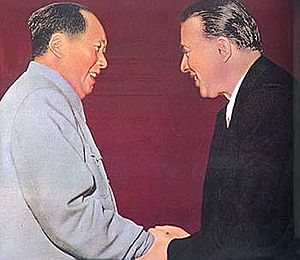
In 1956, Hoxha called for a resolution to support the current party leadership. This was accepted, and delegates who spoke against it were removed from the party and imprisoned. Hoxha claimed that Yugoslavia had tried to overthrow Albania's leadership. This event made Hoxha's power stronger and prevented Khrushchev-style reforms in Albania. In the same year, Hoxha visited China and met Mao Zedong. Chinese aid to Albania increased a lot over the next two years.
To keep Albania on its side, the Soviet Union increased aid, but relations remained tense. In 1960, Khrushchev met a Greek politician and seemed to support the idea of an independent Greek region in southern Albania. Hoxha reacted by sending a lower-ranking official to a major communist meeting.
Problems with the Soviet Union
Relations with the Soviet Union quickly got worse. The Soviets reduced grain shipments when Albania needed them most. In July 1960, a plot to overthrow the Albanian government was discovered. After this, two pro-Soviet party members were removed.
In August, the Albanian party complained to the Soviet party about their ambassador in Tirana. The Fourth Congress of the Party, in February 1961, was the last time the Soviet Union or other Eastern European nations attended a meeting in Albania. During the congress, Mehmet Shehu said that Albania was led by true Marxists, unlike the Soviet Union.
The Soviet Union responded by threatening "serious consequences" if Albania didn't take back its criticisms. Days later, Khrushchev threatened to cut off economic aid. In March, Albania was not invited to a Warsaw Pact meeting, and in April, all Soviet technicians left Albania. In May, most Soviet troops left the submarine base.
On November 7, 1961, Hoxha gave a speech calling Khrushchev a "revisionist" and "anti-Marxist." He presented Stalin as the last true Communist leader of the Soviet Union. By November 11, the USSR and other Warsaw Pact nations broke off diplomatic relations with Albania. Albania was no longer part of the Warsaw Pact or Comecon. The Soviet Union also tried to take control of the submarine base, but Albania passed a law preventing any other nation from owning an Albanian port. The Soviet–Albanian split was complete.
Later Rule (1965–1985)
As Hoxha continued to lead, he became more focused on communist theory. He wrote criticisms of other communist ideas, especially Maoism after 1978. A big achievement under Hoxha was the improvement of women's rights. Albania had been a very traditional country where women had few rights.
The old Code of Lekë said that "A woman is known as a sack, made to endure as long as she lives in her husband's house." Women were not allowed to get a divorce. During World War II, Albanian Communists encouraged women to join the fighters. After the war, women were encouraged to take on jobs. In 1938, only 4% of women worked. By 1970, this number rose to 38%, and by 1982, to 46%.
During the Cultural and Ideological Revolution (discussed below), women were encouraged to take on all kinds of jobs, including government positions. By 1985, 40.7% of local councils and 30.4% of the national assembly were made up of women. Education for girls also greatly increased. In 1969, direct taxes were removed, and schooling and healthcare continued to get better. A campaign to bring electricity to the whole country started in 1960. Albania achieved this on October 25, 1970, becoming the first nation in the world with complete electrification. During the Cultural & Ideological Revolution of 1967–1968, the military changed its tactics and removed military ranks, which were not fully brought back until 1991.
Hoxha's rule also included building a huge number of concrete bunkers across the country. There were over 173,000 bunkers for a population of 3 million people. These were built to protect against possible invasions. The bunkers were strong and could be moved easily. They included machine gun bunkers, beach bunkers, and even underground naval and air force bunkers.
Hoxha's policies inside Albania were similar to Stalin's, whom he admired. A "cult of personality" grew around him, much like the one around Stalin. Hoxha was seen as a genius who knew about everything from culture to economics to military matters. Every schoolbook had one or more quotes from him. The Party gave him titles like Supreme Comrade and Great Teacher. He even introduced a special military salute where soldiers curled their right fist and raised it to shoulder level.
Hoxha also encouraged a high birthrate. Women who had many children were given a government award called Heroine Mother along with money. As a result, Albania's population tripled from 1 million in 1944 to about 3 million in 1985.
Relations with China
At the start of Albania's Third Five-year Plan, China offered Albania a loan of $125 million to build twenty-five chemical, electrical, and metal factories. However, it was hard to complete these projects because Albania had poor relations with its neighbors and was far from China. Unlike Yugoslavia or the USSR, China had less economic control over Albania during Hoxha's rule. Before this, at least 50% of Albania's economy depended on foreign trade.
By the time the 1976 Constitution was written, Albania had become mostly self-sufficient but lacked modern technology. Hoxha liked Mao's ideas because Mao criticized Nikita Khrushchev and Yugoslavia. The financial aid from China was interest-free and didn't have to be repaid until Albania could afford it.
China never interfered with Albania's economy, and Chinese technicians and Albanian workers earned the same wages. Albanian news was reprinted in Chinese newspapers and read on Chinese radio. Albania also led the effort to give China a seat on the United Nations Security Council. During this time, Albania became the second-largest producer of chromium in the world, which was important to China. China hoped to gain more allies in Eastern Europe through Albania. Zhou Enlai visited Albania in January 1964, and a joint statement was signed.
Like Albania, China defended pure Marxism by criticizing both US imperialism and "Soviet and Yugoslav revisionism." However, China's foreign policy began to change, which caused problems for Albania. Also, unlike with Yugoslavia and the Soviet Union, the alliance with China didn't have a clear way for regular discussions and planning. Mao said in 1966 that Albania was the only Marxist-Leninist state in Europe and that an attack on Albania would mean dealing with China. Hoxha also said that the two parties and peoples would always stay together.
Changes in China's Foreign Policy
During the Cultural Revolution in China, its relations with Albania remained good. On August 20, 1968, Albania condemned the Soviet invasion of Czechoslovakia. Albania refused to send troops to Czechoslovakia and officially left the Warsaw Pact on September 5.
Albania's relations with China started to get worse on July 15, 1971, when US President Richard Nixon agreed to visit China. Hoxha believed China had betrayed Albania. On August 6, the Albanian party sent a letter to the Chinese party calling Nixon an "anti-Communist."
China responded by saying Albania could not expect endless aid. In 1972, Albania was told to lower its expectations for Chinese help with its economy. In response, Albania increased trade with other countries, including COMECON (but not the Soviet Union) and Yugoslavia.
After Mao's death on September 9, 1976, Hoxha was still hopeful about relations with China. But in August 1977, Hua Guofeng, China's new leader, said that Mao's Three Worlds Theory would be official foreign policy. Hoxha saw this as a way for China to justify trading with the US. From August 30 to September 7, 1977, Tito visited Beijing and was welcomed by the Chinese leaders. After this, the Albanian party declared that China was now a "revisionist" state, like the Soviet Union and Yugoslavia, and that Albania was the only true Marxist–Leninist state.
On July 13, 1978, China announced it was cutting off all aid to Albania. For the first time in modern history, Albania had no major ally or trading partner.
Political Control and Travel
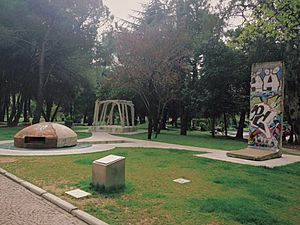
The 1976 constitution limited political freedoms that the government saw as going against its rules. The government controlled all information, and people could only access media approved by the state. Inside Albania, the secret police, called the Sigurimi, used strict methods. At one point, it was said that one out of every three Albanians had either been questioned by the Sigurimi or sent to labor camps. The government arrested thousands of people or sent them to labor camps for supposed crimes like treason or disrupting the government.
After 1968, traveling abroad was forbidden for most people, except for official business. Western European culture was viewed with great suspicion. All unauthorized foreign materials were banned, and people were arrested for having them. Art had to follow the style of socialist realism. Certain traditions, like growing beards, were discouraged.
Court trials were often not fair. To reduce the threat from political opponents, families of those accused were also often arrested or treated badly. Many people were arrested or sent to labor camps if they disagreed with the government. In 1985, it was estimated that about 32,000 people were imprisoned in Albania.
Article 47 of the Albanian Criminal Code said that trying to leave the country or refusing to return was an act of treason. This crime could lead to a minimum sentence of ten years in prison.
Religion in Albania
Albania was the only country in Europe where most people were Muslim at that time. Hoxha believed that dividing Albanian society by religion was a serious problem, as it caused conflicts and divided the nation. The Agrarian Reform Law of 1945 took away much of the church's property. Catholics were targeted first because the Vatican was seen as against communism. In 1946, the Jesuit Order was banned, and the Franciscans were banned in 1947. A law called Decree No. 743 aimed to create a national church and stopped religious leaders from connecting with foreign powers.
Mother Teresa, a Catholic nun whose relatives lived in Albania, was not allowed to visit them. The government saw her as a dangerous agent of the Vatican. Despite many requests from different countries, she was not allowed to see her mother and sister, who both died during Hoxha's rule. Mother Teresa was only able to visit Albania five years after the Communist government ended.
The Party focused on teaching atheism in schools. This was effective, especially because of the high birthrate after the war. During religious fasting periods like Lent and Ramadan, food and drinks were given out in schools and factories. People who refused to eat or drink during their fasting times were criticized.
Starting on February 6, 1967, the Party began to promote secularism (non-religious ideas) instead of Abrahamic religions. Hoxha, inspired by China's Cultural Revolution, encouraged young communists and workers to discourage religious practices.
According to Hoxha, this anti-religious movement started with young people. As a result, all 2,169 churches and mosques in Albania were either destroyed or changed for other uses. State atheism became official policy, and Albania was declared the world's first atheist state. Town and city names that had religious meanings were changed to neutral ones, as were personal names. By 1968, Hoxha said that "Religion is a fuel kindling fires of all evils." During this time, religiously based names were also made illegal. A dictionary published in 1982 listed 3,000 approved, non-religious names. In 1992, a Catholic leader said that out of three hundred Catholic priests in Albania before the Communists, only thirty were still active. Promoting religion was banned, and all religious leaders were labeled as against the government. Religious leaders who didn't follow the government's rules were arrested or had to practice their faith secretly.
Promoting Albanian Nationalism
During the anti-religious campaign, Enver Hoxha said that "the only religion of Albania is Albanianism." This quote came from a poem by the 19th-century Albanian writer Pashko Vasa.
Efforts were made to connect Albanians to the ancient Illyrians. The idea that Albanians came from Illyrians became a big part of Albanian nationalism. This led to a return of names thought to be of "Illyrian" origin, instead of names linked to Christianity. This theory was important because it suggested that Albanians had a long history in areas like Kosovo and Southern Albania, which were involved in conflicts with Serbs and Greeks. Under Enver Hoxha's government, the idea that Albanians were native to the region was promoted.
Rejecting Western Culture
Hoxha and his government also disliked Western popular culture and the consumerism and cultural liberalism that came with it. In a speech on June 26, 1973, Hoxha declared a complete break with any Western influence and what he called its "degenerated bourgeois culture."
Later Life and Death
In 1974, Hoxha accused Beqir Balluku, the Minister of Defense and a long-time friend, of being an agent for China and trying to overthrow the government. Balluku had criticized Hoxha's bunker program. Hoxha removed Balluku and his accused friends from their positions and appointed Mehmet Shehu as Minister of Defense.
A new Constitution was approved in November 1976. Hoxha said that the new Constitution would be about building a complete socialist society.
Self-reliance was emphasized more than ever. Citizens were encouraged to train with weapons, and this was also taught in schools. The goal was to create quick partisans (fighters).
Borrowing money and foreign investment were banned under Article 26 of the Constitution. This article said that Albania could not accept money or create joint companies with capitalist countries.
During this time, Albania was the most isolated country in Europe. In 1983, Albania imported goods worth $280 million and exported goods worth $290 million, meaning it sold more than it bought.
In 1981, Hoxha made changes in the government, and some officials were removed from their positions. Hoxha also wrote many books during this period, resulting in over 65 volumes of his collected works.
In 1973, Hoxha had a heart attack and never fully recovered. From the late 1970s onward, his health got worse, and he gave most state duties to Ramiz Alia. In his final days, he used a wheelchair and suffered from diabetes and cerebral ischemia. On April 9, 1985, he had a serious heart problem. He died in the early morning of April 11, 1985, at the age of 76. The Albanian government announced seven days of mourning.
Hoxha's body was displayed for three days before he was buried on April 15. The government did not allow any foreign delegations to attend his funeral. After his burial, Ramiz Alia became the new head of state.
Hoxha left Albania with a legacy of isolation and fear of the outside world. Although Albania made some economic progress under his rule, the country faced economic stagnation and was one of the poorest European countries during much of the Cold War.
Family Life
The name Hoxha comes from the Turkish word hoca, which means "teacher." This title was given to his ancestors because they taught Albanians about Islam.
Hoxha's parents were Halil and Gjylihan Hoxha. He had three sisters: Fahrije, Haxhire, and Sanije. His uncle, Hysen Hoxha, was a fighter for Albania's independence, which happened when Enver was four years old. His grandfather, Beqir, was involved in a group called the League of Prizren.
Hoxha's son, Sokol Hoxha, was the CEO of the Albanian Post and Telecommunication service. He is married to Liliana Hoxha. Sali Berisha, who later became a democratic president of Albania, was often seen with Sokol Hoxha and other relatives of important communist figures.
Hoxha's daughter, Pranvera, is an architect. With her husband, Klement Kolaneci, she designed the Enver Hoxha Museum in Tirana, which was a white pyramid. The museum opened in 1988, three years after her father's death. In 1991, it was changed into a conference center and exhibition place called Pyramid of Tirana.
Attempts to Overthrow the Government
There were attempts to overthrow the government, but they were not successful.
According to Hoxha, documents found after Prime Minister Mehmet Shehu's death in 1981 suggested that Yugoslav intelligence had planned to harm him and take over the country.
Legacy and Public Opinion
A 2016 survey found that 45% of Albanians believe Enver Hoxha had a positive impact on Albania's history, while 42% think his impact was negative. Younger people (aged 16–35) tend to have a more negative view, while older generations (over 35) tend to have a more positive view. People in southeastern and southwestern Albania had the most positive views of Hoxha.
Awards
- Albania
| Hero of the People, twice (taken away in 1995) | |
| Hero of Socialist Labour | |
| Order of Skanderbeg, 1st Class |
- Foreign Awards
| Order "For Bravery" 1st Class (Bulgaria) (September 9, 1944) | |
| Order of the People's Hero (Yugoslavia) (1946) | |
| Order of Suvorov, 1st Class (Soviet Union) (1948) | |
| Order of Lenin (Soviet Union) |
Images for kids
See also
 In Spanish: Enver Hoxha para niños
In Spanish: Enver Hoxha para niños
 | Isaac Myers |
 | D. Hamilton Jackson |
 | A. Philip Randolph |


